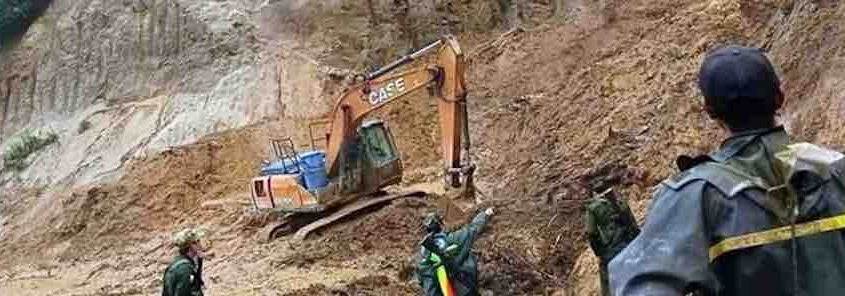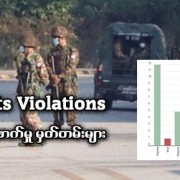Collapse at notorious Myanmar rare earth mine kills 15 people
Boom in unregulated mining is fueled by demand from China and beyond for minerals used in electric vehicles.
Rescuers recovered the bodies of 15 mine workers in northern Myanmar on Friday after a landslide at a rare earths mine, residents said, the latest deaths in an unregulated industry feeding surging demand for the minerals in China and beyond.
Thirty workers, most of them young men, were trapped in the Pang War mine in Kachin state when the collapse occurred at around midnight on Wednesday, a relative of one of the missing miners told Radio Free Asia.
“Fifteen bodies have been found so far. Two women were among them,” said the resident, who like other sources in this article declined to be identified for security reasons.
A Chinese national and 13 other workers were still missing on Thursday, residents told RFA.
The landslide was the second major disaster at the mine this month. A June 4 landslide killed more than 20 people, including three Chinese citizens.
There have been several other smaller landslides there since late May. Wednesday’s slide overtook a living area and facility where the minerals are processed, a Pang War miner said.
“Currently, it is the rainy season,” he said. “Over the past week, continuous rainfall has weakened the ground.”
Another Pang War resident told RFA that landslides weren’t a common occurrence during previous rainy seasons.
“However, due to the fragmentation caused by extensive digging, the mountains have weakened significantly and lost their stability,” he said. “Additionally, deforestation has exacerbated this situation.”
Elements for electric vehicles
A surge in the illegal mining of rare earth metals in northern Myanmar is being driven by demand from neighboring China for terbium and dysprosium – elements that are used in the production of electric vehicles, environmental activists say.
Pang War is in an area under the control of junta forces but the mining and the pollution it generates are largely unregulated.
RFA called Kachin state’s junta spokesperson, Moe Min Thein, for information on the landslide but he did not immediately respond.
Environmentalists say companies from China, where mining has become increasingly regulated due to safety and environmental concerns, fund the mining and ship the ore across the nearby border for processing and sale into global supply chains.
Chinese nationals are increasingly seen working at the mines, residents say. RFA contacted China’s embassy in Myanmar for comment but it did not reply by the time of publication.
The number of rare earth mines in resource-rich Kachin state grew by 40% between 2021 and 2023, the environmental group Global Witness said in a recent report. There are more than 300 mines in the state’s Special Region 1 of the township, it said.
There has also been an increase of fighting in the state between junta forces and the autonomy-seeking Kachin Independence Army, at times over access to resources and trade routes.
The fighting this year has displaced and killed civilians and comes as forces of the junta that seized power in a 2021 coup have faced setbacks in several parts of the country including Kachin state.
Environmental activists say all sides in Myanmar’s northernmost state seek profits from its resources, including from rare earths.







